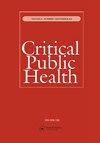Systematically omitting indoor air quality: sub-standard guidance for shelters, group homes and long-term care in Ontario during the COVID-19 pandemic
IF 2.3
3区 医学
Q2 PUBLIC, ENVIRONMENTAL & OCCUPATIONAL HEALTH
引用次数: 0
Abstract
Public Health Ontario (PHO) is mandated by legislation to share scientific advice during infectious disease outbreaks and help reduce health inequities in Ontario, Canada. PHO was founded in part to address the failures of Ontario’s public health system during the 2003 outbreak of SARS-CoV-1, which included the failure to address airborne transmission. By January 2021, public health authorities had access to a body of literature suggesting SARS-CoV-2 was airborne, and had received urgent warnings from scientists. We set out to document how PHO responded to the likelihood – and, eventually, the certainty – of airborne transmission in the context of its guidance for congregate settings such as long-term care and shelters. In October 2021, we reviewed PHO’s public, written COVID-19 guidance for these settings, with a focus on indoor air quality (IAQ) measures that mitigate airborne transmission, such as ventilation. We identified 11 PHO documents for congregate settings. They contained no references to IAQ measures. We did, however, find references to IAQ measures in parallel documents for schools, summer camps, and clinical offices. Our findings demonstrate PHO omitted key infection prevention measures from its COVID-19 guidance for congregate settings, putting workers and residents at greater risk of exposure, illness and death, and exacerbating health inequities.系统地忽略室内空气质量:在2019冠状病毒病大流行期间,安大略省的避难所、集体之家和长期护理指导不合标准
立法授权安大略省公共卫生部(PHO)在传染病暴发期间分享科学建议,并帮助减少加拿大安大略省的卫生不公平现象。PHO成立的部分原因是为了解决2003年SARS-CoV-1爆发期间安大略省公共卫生系统的失败,其中包括未能解决空气传播问题。到2021年1月,公共卫生当局获得了大量文献,表明SARS-CoV-2是通过空气传播的,并收到了科学家的紧急警告。我们着手记录PHO如何在其对长期护理和庇护所等聚集环境的指导背景下应对空气传播的可能性(最终是确定性)。2021年10月,我们审查了PHO针对这些环境的COVID-19公开书面指南,重点是减轻空气传播的室内空气质量(IAQ)措施,如通风。我们为集合设置确定了11个PHO文档。它们没有提及室内空气质量措施。然而,我们确实在学校、夏令营和诊所的平行文件中找到了对室内空气质量测量的参考。我们的研究结果表明,PHO在其针对聚集环境的COVID-19指南中省略了关键的感染预防措施,使工人和居民面临更大的暴露、疾病和死亡风险,并加剧了卫生不平等。
本文章由计算机程序翻译,如有差异,请以英文原文为准。
求助全文
约1分钟内获得全文
求助全文
来源期刊

Critical Public Health
Multiple-
CiteScore
5.90
自引率
7.10%
发文量
36
期刊介绍:
Critical Public Health (CPH) is a respected peer-review journal for researchers and practitioners working in public health, health promotion and related fields. It brings together international scholarship to provide critical analyses of theory and practice, reviews of literature and explorations of new ways of working. The journal publishes high quality work that is open and critical in perspective and which reports on current research and debates in the field. CPH encourages an interdisciplinary focus and features innovative analyses. It is committed to exploring and debating issues of equity and social justice; in particular, issues of sexism, racism and other forms of oppression.
 求助内容:
求助内容: 应助结果提醒方式:
应助结果提醒方式:


